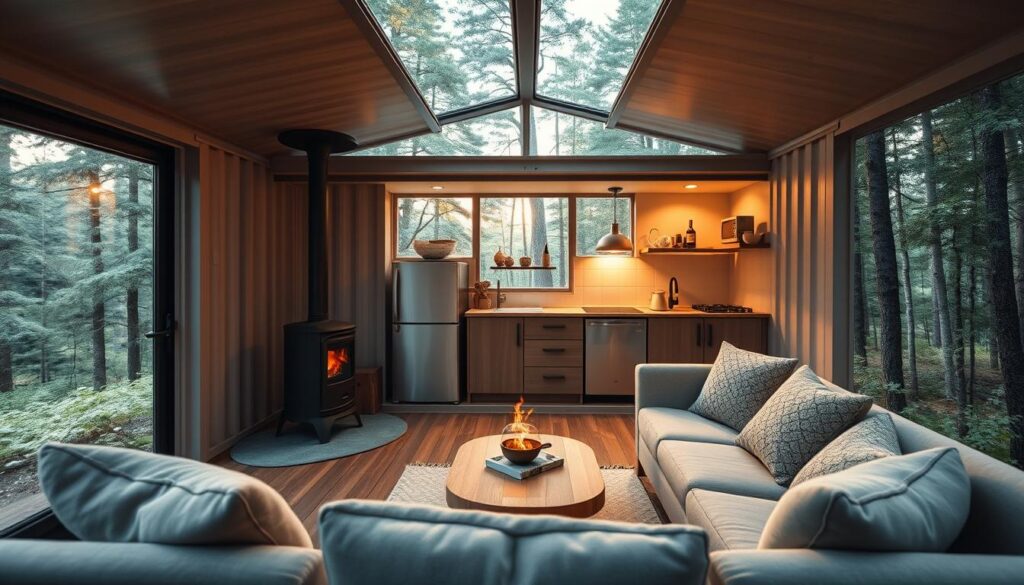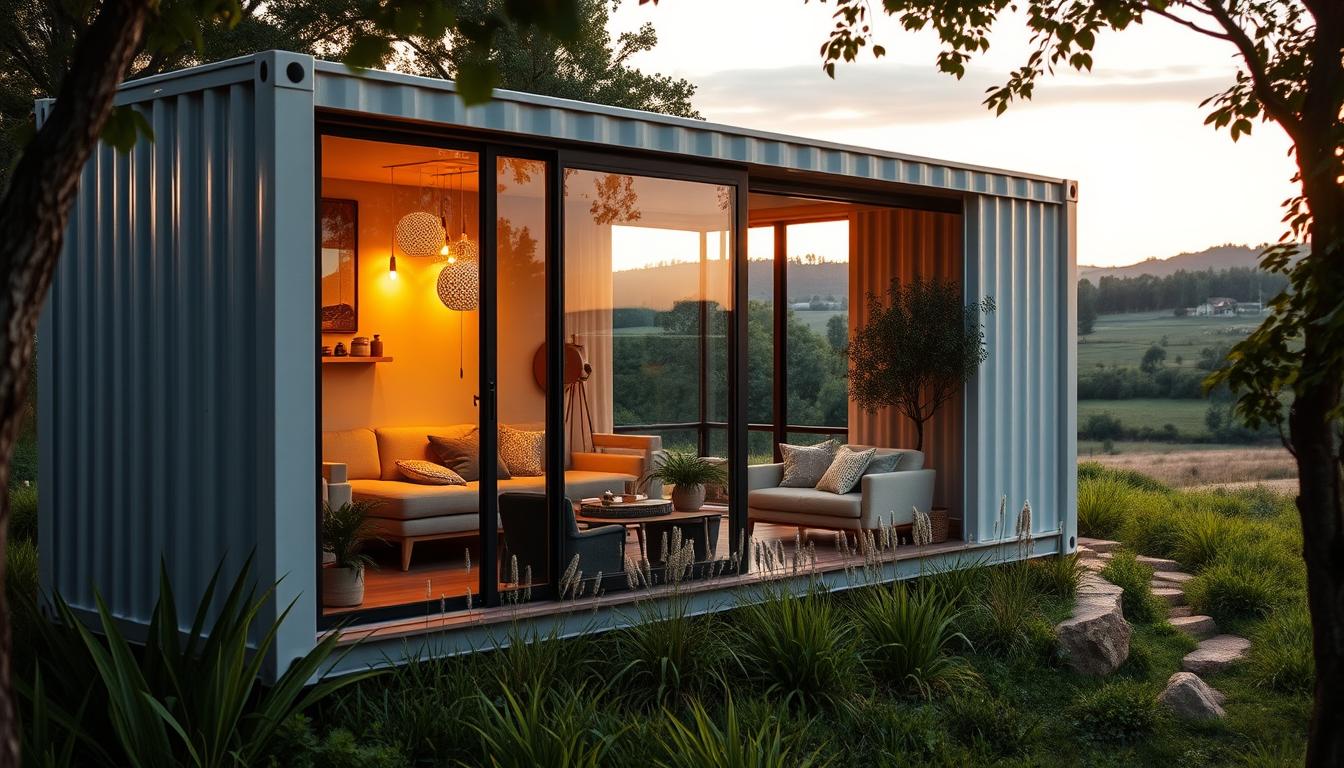Are you ready to turn your unique container home into a lucrative side hustle? With the rise of alternative accommodations, listing your container home on Airbnb can be a great way to earn extra income.
Container homes are becoming increasingly popular among travelers looking for unique Airbnb accommodations. By hosting on Airbnb, you can capitalize on this trend and share your space with adventurous guests.
As a container home host, you’ll have the opportunity to showcase your creativity and hospitality. In this guide, we’ll walk you through the basics of getting started and maximizing your earnings.
Key Takeaways
- Discover the benefits of listing your container home on Airbnb
- Learn how to create an attractive and competitive listing
- Understand the importance of setting competitive pricing
- Find out how to provide an exceptional guest experience
- Explore tips for managing bookings and guest communications
The Rising Popularity of Container Homes on Airbnb
The rise of container home rentals on Airbnb reflects a growing demand for sustainable and stylish accommodations. Travelers are increasingly seeking out unique experiences, and container homes are at the forefront of this trend.
Why Travelers Are Drawn to Unique Accommodations
Travelers are drawn to container homes on Airbnb for their eco-friendly appeal and modern design. As one host notes, “Container homes offer a unique blend of sustainability and style that traditional rentals can’t match.” Discover more about the appeal of container.
Moreover, the compact nature of container homes encourages creativity in design, often resulting in innovative and Instagram-worthy spaces. This uniqueness is a significant draw for travelers looking for a memorable stay.
Market Potential for Container Home Rentals
The market potential for container home rentals on Airbnb is substantial, driven by the growing demand for alternative accommodations. As the trend continues, hosts who invest in container homes can capitalize on this demand, offering competitive and attractive options for travelers.
By understanding the appeal of container homes and the needs of travelers, hosts can tailor their offerings to meet this growing demand, potentially leading to higher occupancy rates and increased revenue.
Understanding the Container Home Advantage
Container homes are revolutionizing the short-term rental market with their unique blend of sustainability and affordability. As a host on Airbnb, leveraging these advantages can significantly enhance your rental’s appeal.
Sustainability and Eco-Friendly Appeal
Container homes are made from repurposed shipping containers, reducing waste and promoting eco-friendly tourism. This aspect appeals to environmentally conscious travelers, setting your rental apart from traditional accommodations. As noted by a sustainable tourism expert, “Eco-friendly accommodations are no longer a niche market; they’re becoming the norm for travelers seeking unique experiences.”
“The eco-friendly appeal of container homes is a significant draw for guests looking for sustainable tourism options.”
Cost-Effectiveness Compared to Traditional Rentals
Container homes offer a cost-effective solution for hosts, with lower initial investment and maintenance costs compared to traditional housing. This cost-effectiveness allows hosts to offer competitive pricing, attracting more guests and increasing occupancy rates.
Flexibility and Mobility Options
The mobility of container homes is another significant advantage, allowing hosts to relocate their rental units in response to changing demand or seasonal fluctuations. This flexibility can be particularly beneficial in areas with fluctuating tourist seasons, enabling hosts to maximize their rental income throughout the year.
By highlighting these advantages in your Airbnb listing, you can attract a wider range of guests and establish a competitive edge in the short-term rental market.
Legal Considerations Before Renting Out a Container Home on Airbnb
Navigating the legal requirements for container home rentals on Airbnb is essential for success. Hosts must be aware of the various legal considerations to avoid potential issues that could impact their business.
Zoning Laws and Local Regulations
Understanding local zoning laws and regulations is crucial when renting out a container home. These laws can vary significantly between urban and rural areas.
Urban vs. Rural Requirements
Urban areas often have stricter zoning laws compared to rural areas. For instance, some cities may require special permits for short-term rentals.
HOA and Community Restrictions
Homeowners Associations (HOAs) and community restrictions can also impact your ability to rent out your container home. It’s essential to review these agreements before listing your property.
Permits and Licenses Required
Obtaining the necessary permits and licenses is a critical step in legally renting out your container home. The specific requirements can vary by location.
| Location Type | Typical Permit Required | Additional Requirements |
|---|---|---|
| Urban | Short-Term Rental Permit | Business License, Health Department Permit |
| Rural | Zoning Compliance Certificate | Environmental Impact Assessment |
Insurance Requirements for Short-Term Rentals
Adequate insurance coverage is vital for protecting your investment. Many jurisdictions require specific insurance policies for short-term rentals.
Key insurance considerations include:
- Liability coverage for guest accidents
- Property damage coverage
- Business interruption insurance
By understanding and complying with these legal considerations, you can ensure a successful and stress-free container home rental experience on Airbnb.
Setting Up Your Container Home for Guests
To ensure a comfortable stay for your guests, setting up your container home with the right amenities is crucial. This involves careful consideration of the essentials that make a rental feel like home.
Essential Amenities for Comfort
Providing the right amenities can significantly enhance your guests’ experience. This includes both the basics and some thoughtful extras.
Bedroom and Living Space Essentials
A comfortable bed with high-quality linens, adequate storage for clothing, and a pleasant living area are fundamental. Consider adding cozy touches like throw blankets and artwork to make the space feel welcoming.
Kitchen and Bathroom Necessities
Equip your kitchen with essential appliances and utensils, and ensure the bathroom is well-stocked with towels and toiletries. A fully functional kitchen and a clean, comfortable bathroom are critical for guest satisfaction.
Utilities and Infrastructure Needs
Ensuring that your container home is properly connected to necessary utilities is vital. This includes electricity, water, and internet. Consider the infrastructure needs such as plumbing and electrical systems to avoid any issues during your guests’ stay.

Safety Features and Compliance
Safety should be a top priority. Install smoke detectors, ensure there are clear exit routes, and comply with local safety regulations. Providing a safe environment not only protects your guests but also enhances your reputation as a host.
By focusing on these aspects, you can create a welcoming and safe environment for your guests, enhancing their experience and encouraging positive reviews for your airbnb container rental.
Designing an Instagram-Worthy Container Space
Designing a container home that attracts guests on Airbnb requires a mix of style and practicality. To make your unique Airbnb accommodation stand out, you need to focus on creating a welcoming and visually appealing space.
Interior Design Tips for Small Spaces
When it comes to interior design for small container homes, maximizing space is crucial. Opt for multi-functional furniture that serves more than one purpose, such as a storage ottoman or a murphy bed. Use light colors on walls and floors to create a sense of openness and make the space feel larger.
Another effective strategy is to utilize vertical space by installing shelves or storage units that go up to the ceiling. This not only keeps the floor clear but also adds to the aesthetic appeal by drawing the eye upwards.
| Design Element | Benefit |
|---|---|
| Multi-functional Furniture | Saves space and adds functionality |
| Light Colors | Makes the space feel larger and more open |
| Vertical Storage | Maximizes storage without cluttering the floor |
Creating Outdoor Living Areas
Outdoor living areas can significantly enhance the appeal of your container home vacation rental. Consider adding outdoor furniture that is comfortable and weather-resistant. Creating a cozy nook with pillows, blankets, and a small table can make the outdoor space inviting.
If possible, incorporate some greenery like potted plants or a small herb garden to bring in a natural element. This not only beautifies the space but also adds a touch of serenity.
Photography Tips for Listing Your Container Home
High-quality photos are essential for attracting guests to your Airbnb container stay. Use good lighting by taking photos during the day with natural light. Avoid using too many props or overly staging the space; instead, focus on capturing the authentic feel of the container home.
Consider hiring a professional photographer who has experience with real estate or interior photography to ensure your listing looks its best.
Pricing Strategies for Your Container Home Rental
To attract guests and ensure a steady income, it’s essential to develop a pricing strategy tailored to your container home rental. This involves understanding the market, knowing your costs, and being aware of the demand for unique accommodations in your area.
Researching Competitive Rates in Your Area
Researching what similar container homes are charging in your area is a crucial step. Look at listings on Airbnb and other platforms to understand the going rate for comparable properties. Consider factors like location, amenities, and the overall experience you offer. This research will help you set a competitive price that attracts guests. Use tools like Airbnb’s pricing tips or third-party software to stay updated on market trends.
Seasonal Pricing Adjustments
Adjusting your pricing according to seasonal demand can significantly impact your earnings. During peak travel seasons or local events, you can charge higher rates. Conversely, lowering your prices during off-peak times can help maintain occupancy. Analyze local calendars and events to anticipate demand fluctuations. Consider using dynamic pricing tools to automatically adjust your rates based on demand.
Special Offers and Discounts

Offering special deals or discounts can be an effective way to attract more guests. Consider discounts for long-term stays, last-minute bookings, or off-season stays. You can also offer extras like welcome baskets or local guides to enhance the guest experience. Promote these offers through your Airbnb listing and social media channels to attract more bookings.
Marketing Your Container Home on Airbnb
To stand out in the competitive Airbnb market, you need to market your container home effectively. A well-crafted listing and strategic promotion are key to attracting potential guests and maximizing bookings.
Crafting an Attention-Grabbing Listing
Your Airbnb listing is often the first impression potential guests have of your container home. To make it count, focus on creating a compelling title and description that highlight the unique features of your property. Use high-quality photos and include relevant keywords like “airbnb container stay” to improve visibility in search results.
Some essential elements to include in your listing are:
- A detailed description of your container home’s amenities
- Information about the local area and attractions
- House rules and any specific guest requirements
Highlighting Unique Features and Experiences
One of the main advantages of container home hosting is the unique experience it offers guests. Emphasize the distinctive aspects of your property, such as its eco-friendly design or compact layout, in your listing and marketing materials. Consider offering special experiences, like a guided tour of the local area or a welcome basket with local goodies, to make your guests’ stay even more memorable.
Some ideas for unique experiences include:
- Providing a local guidebook with insider tips
- Offering a complimentary local craft or food item
- Organizing a special event or activity for guests
Leveraging Social Media for Promotion
Social media is a powerful tool for promoting your container home rental on Airbnb. Share high-quality photos and updates about your property on platforms like Instagram and Facebook to attract potential guests. Use relevant hashtags, such as #containerhome or #airbnb, to increase your visibility and reach a wider audience.
By implementing these marketing strategies, you can effectively promote your container home on Airbnb and attract more guests. Remember to continually monitor and adjust your approach to optimize your results.
Managing Bookings and Guest Relations
Creating a positive experience for guests in your container home vacation rental starts with effective booking management and guest communication. As a host, you need to strike the right balance between being welcoming and maintaining your space.
Setting House Rules and Expectations
Establishing clear house rules is essential for a harmonious stay. Outline your expectations regarding noise levels, guest limits, and space usage in your listing description and upon check-in. This clarity helps prevent misunderstandings and ensures a smooth experience for both you and your guests.
Check-in Procedures and Guest Communication
A seamless check-in process is vital. Provide detailed instructions on how to access your container home, including lock codes or key locations. Regular communication before and during the stay can enhance the guest experience. Be responsive to inquiries and provide helpful tips about your unique Airbnb accommodation and its surroundings.
Handling Reviews and Feedback
After the stay, encourage guests to leave a review. Respond promptly to all feedback, whether positive or negative. This not only shows that you value their opinion but also helps potential future guests. As the saying goes, “The customer is the king.” A quote from Jeff Bezos, “We see our customers as invited guests to a party, and we are the hosts,” resonates well in this context. Use feedback to improve your container home vacation rental and maintain high standards.
By focusing on these aspects, you can create a welcoming and well-managed space that attracts repeat visitors and positive reviews, ultimately making renting out a container home on Airbnb a rewarding experience.
Financial Aspects of Container Home Hosting
Hosting a container home on Airbnb can be a lucrative venture, but understanding the financial aspects is crucial for success. As a host, you need to consider various expenses and potential income streams to ensure your container home rental is profitable.
Initial Investment and Return Calculations
When calculating the initial investment for your container home, consider the purchase or conversion cost of the container, furnishing, and any necessary permits. A detailed breakdown of these costs is essential for determining your return on investment (ROI).
| Expense Category | Estimated Cost |
|---|---|
| Container Purchase/Conversion | $15,000 – $30,000 |
| Furnishing and Appliances | $5,000 – $10,000 |
| Permits and Licenses | $1,000 – $3,000 |
| Total Estimated Initial Investment | $21,000 – $43,000 |
To calculate your potential ROI, you’ll need to estimate your monthly revenue based on occupancy rates and nightly pricing, then subtract your ongoing expenses, such as cleaning, utilities, and maintenance.
Tax Considerations for Short-Term Rentals
As an Airbnb host, you’re considered self-employed and must report your income on your tax return. You can deduct expenses related to your rental activity, such as mortgage interest, property taxes, and operating expenses. It’s advisable to consult with a tax professional to ensure you’re taking advantage of all eligible deductions.
For example, if you’re earning $5,000 per year from your Airbnb container rental, you may be able to deduct $2,000 in expenses, reducing your taxable income.
Bookkeeping and Expense Tracking
Accurate bookkeeping is vital for managing your container home rental’s finances effectively. Use a dedicated accounting system to track income, expenses, and tax deductions. Regularly reviewing your financial statements will help you make informed decisions about your business.
Conclusion: Building a Successful Container Home Rental Business
Renting out a container home on Airbnb can be a lucrative business with the right strategies and planning. By understanding the container home advantage, navigating legal considerations, and focusing on guest experience, you can create a unique and profitable hosting container home.
To succeed, it’s essential to carefully plan and execute your container home vacation rental. This includes designing an attractive space, setting competitive pricing, and effectively marketing your airbnb container stay. By doing so, you can attract travelers looking for unique accommodations and build a successful business.
For more insights and tips on creating a successful container home rental, visit Discover Containers to learn from industry experts and stay ahead in the market.

